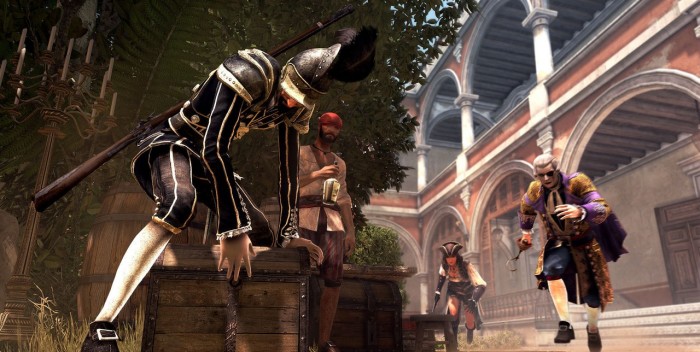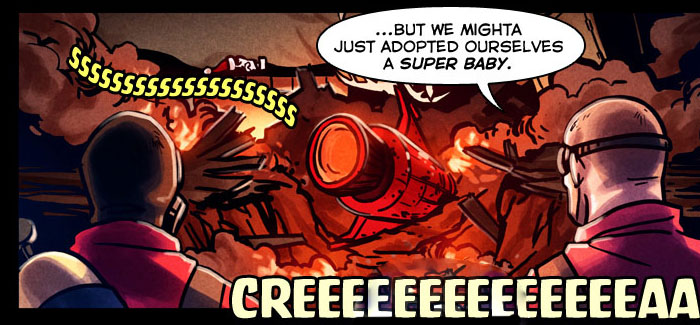


After reading my Assassin’s Creed 3 multiplayer abilities and crafting guide, it’s only natural you wanted more information on setting up your ability slots. After all, that stuff only makes up the active half of assassination… what about passive effects?
Today, we’re taking a look at the perks, streaks, and bonuses available in Assassin’s Creed 3 multiplayer. Find out what every option does, where it shines, and whether or not you should be using each passive boost available. Combined with our abilities advice, you’ll have an excellent head-start in virtual colonial manslaughter.
Perks are always-on effects you choose that give your persona an advantage in certain gameplay situations. Some are offensive in nature, letting you find and kill your targets more easily. Others are defensive, allowing you to hide and escape from would-be murderers. Yet other perks are fairly neutral, granting bonuses that influence the way you navigate or use your abilities.
For each ability set, you may have exactly two perks. For the most part, there’s no downside to filling them right away, so study the advice below and stock up on the passive boons that best resonate with your game mode and personal style.
Ideal for the lonely-hearted, Blender ensures you’re never alone. Whenever your persona enters a blend group, if there are no duplicates already within, one will randomly transform into a clone of you. The animation is noticeable, but quick, and the effect lasts indefinitely. If you move to a new blend group, your magically-created copy will revert, and a fresh clone will spring up in your new group.
Blender is a strong consideration for Deathmatch, where there are no natural clones of your character. It allows you to constantly create diversions without expending an ability slot, something most perks can’t do. It’s also generally useful whenever you’re on defense, since generating additional twins will always decrease the odds that your pursuers will identify you correctly.
While Blender is powerful, it does have its downsides – this perk has no use on offense, and can actually be a detriment when you’re on the hunt. If you move into a blend group with or near your target, he or she is likely to notice the animation of a fresh copy being spawned. Your cover as a real player will immediately be blown, costing you an otherwise high-scoring kill.
Don’t have any good ideas for an ability set? Or perhaps you’re simply too starved for Abstergo points to buy one? No problem. Copycat will duplicate the skill loadout of anyone who kills you, giving you instant access to whatever overpowered abilities led to your most recent demise.
With rare exception, Copycat is terrible. Sure, having access to better skills might net you an advantage, but they might also throw off your gameplan. Upon your death, you may find the person who just off’d you is actually in possession of a fairly terrible bunch of abilities. Hell, they might be using the same stuff you are! To that effect, Copycat is a risky way to use one of your perk slots, since odds are it won’t yield anything useful. And, even if your killer does have something cool, how much will it really help you recover?
With Hot Pursuit active, winning chases is much easier. You’ll get a speed boost whenever you run after your target, giving him or her less time to escape your blade. Additionally, your Approach Meter will deplete more slowly, so even when you do have to run, you won’t lose as many points.
Hot Pursuit is a fairly strong option for offensive play, since it basically removes the option of winning chases from your intended murder victims. Additionally, the second, score-boosting effect will net you quite a few more points over the course of a match. It won’t make or break a hotly contested round, but extra experience is never a bad thing, right?
Of course, Hot Pursuit doesn’t have any uses for defense, as the speed boost only applies while you’re on the hunt. You can, in theory, attain the acceleration while simultaneously chasing your target and running from your pursuer, but this scenario is highly unlikely to occur.
When you’ve got Kill Buffer, you take your streaks with you upon death. More specifically, Kill Buffer gives you a penalty of -1 instead of resetting your Kill Streak whenever you would normally lose it. So if you’ve built up 6 out of 7 kills/stuns needed to activate your Streak and suddenly get shot, you’ll respawn at 5 out of 7 (instead of the normal zero).
Kill Buffer is incredibly powerful when paired with high-cost Kill Streaks, making some that are typically impossible more attainable. Since building up six or more kills/stuns can often be a matter of luck, this perk preserves most of your momentum, making it more likely you’ll land a Mass Morph or Animus Hack. In general, Kill Buffer works better in frantic game modes like Assassinate and Deathmatch, where you’re more likely to be using a higher-requirement Kill Streak.
Note that Kill Buffer has limited utility on lower-numbered streaks. For instance, using it with the Silent +250 would be a waste, since it only requires three hits to trigger. If you died with either zero or one stuns, Kill Buffer would provide no benefit. You’d only get a bonus if you were assassinated with exactly two kills in your queue! By comparison, Kill Buffer would offer valuable momentum at anywhere between two and seven kills for the highest-requirement Kill Streak.
Easily the most versatile perk in the game, Overall Cooldowns cuts down the delay of your activated abilities whenever you use them. As a result, you’ll get to drop more Smoke Bombs, fire more Throwing Knives, and create more Decoys than you’d normally be able to.
There is no time when Overall Cooldowns is bad, since having more frequent access to your skills is a powerful effect. Hell, Overall Cooldowns is actually better in AC3 than it was in Brotherhood or Revelations, since it now affects three abilities’ cooldowns (as opposed to two, previously).
It’s important to remember that since Overall Cooldowns applies a fixed reduction in cooldown time, its effect is more pronounced on abilities that already have a shorter cooldown. For example, a skill that goes from a 50 second cooldown to a 40 second one gets a 20% reduction. By contrast, an ability that goes from 100 seconds to 90 only sees a 10% drop in delay. Of course, if those ten seconds save your life even once, it’s probably worth it!
Making a return from Revelations, the Resilience perk cuts the duration of abilities used on you by about half. Tripwire Bombs, Wipe, Throwing Knives, and the like are all greatly weakened against you, making it more likely you’ll escape these traps with your life.
Resilience tends to offer the most value in Wanted and Deathmatch, where one-on-one fights typically boil down to “who hits whom first.” If your target throws a Smoke Bomb or launches knives at you from close range, Resilience won’t help… but if he or she flings abilities your way from across the room, odds are they’ll dissipate before you eat a big, fat, fist. Even in other situations, Resilience has its uses, like letting you recover from a Wipe in time to shoot a fleeing opponent.
The only real downside of Resilience is that the perk icon displays over your character’s head whenever it takes effect. So yes, you’ll recover from a Tripwire Bomb faster than normal, but your enemies will also be able to identify you in a crowd of NPCs more easily. In most cases this won’t be a factor, but be prepared to get ousted by wayward (reduced duration) Firecrackers every now and then.
The kid brother to Resilience, Resistance instead decreases the time you spend stunned whenever someone slaps you in the face. You’ll spend less time on the ground, shaking off your failures and getting on with life. New to AC3, Resistance also confers a reduction in dizzy time following a Contested Kill. Your character will recover from poorly executed executions more quickly, ready to face down the next foe.
Resistance is a very strong pick for offensive team modes and for Assassinate. In matches of Manhunt, for instance, spending less time recuperating from offensive blunders means you have more opportunities to get revenge on the guy who stunned/contested you. In fact, your reduced incapacitation may throw off defenders who didn’t expect you to get up so quickly. In Assassinate, Resistance allows you to plow forward from Contested Kills, which are common due to the mutual locking that so often occurs. The stun recovery isn’t as valuable here, but it might force other players to kill you sooner than they’d like, robbing them of valuable points.
Resistance, like Resilience, shows an icon when it takes effect, but unlike Resilience, this perk won’t really give your identity away. Everyone will know you’re a player whenever you get stunned or contested anyway, so your cover will only be blown when you yourself blow it.
If you don’t like letting anything slip out of your grasp, Sentry may be for you. This perk increases the time your synch-lock stays on a character that’s left your field of view. Other players will therefore have a tough time shaking you, giving you an advantage in any scenario where locking on for long periods of time is necessary.
Despite its power, Sentry is a relatively narrow boon. You’re not likely to need the extra time in most situations, and even when you do get extra information out of it, just knowing the exact location of an opponent may not be enough to matter in the long run. It’s a shame, because Sentry is a cool idea in theory – perhaps Ubisoft will find a way to buff it for Assassin’s Creed 3, Part 2.
There is one particular use for Sentry that should be mentioned: it makes you immune to “corner stuns.” You see, many savvy enemies will run around a corner, count out the default lock duration, and use its expiration as the perfect time to jump out and get a cheap stun on their unlocked pursuer. Since nobody expects you to use Sentry, it can catch would-be corner stunners completely off guard. It’s a very narrow advantage, but something to consider if you find everyone in your lobby is employing this trick.
The opposite of Hot Pursuit, Sixth Sense makes evasive maneuvers easier to achieve thanks to both its bonuses. The first provides you with a visual and audio alert whenever a pursuer enters high profile off-screen. The second drastically slashes the time needed to win an escape once you’ve broken line of sight. In total, Sixth Sense allows you to better spot your killers, then get away from them more quickly once they’ve made their move.
Sixth Sense has a very specific use: finding and eluding pursuers. It has no value when you’re tracking down your own quarry, but it is a decent insurance option in Wanted. This perk will basically act as a security alarm, watching your back for killers you can’t see. And, if you’re forced to run, you can complete your escape and get back to pursuing your target faster than you’re used to. It’s not an incredibly powerful bonus, but it will definitely save your skin more often than almost any other perk.
In Assassin’s Creed Brotherhood, Basher sucked. In Revelations, Basher still sucked. Now, in AC3, Ubisoft has combined Basher with another perk to create Unstoppable… and it doesn’t totally suck! In addition to being able to charge straight through NPC crowds without losing steam, you’ll get the ability to reset closed Chase Breakers just by approaching them. Now, nothing can slow you down, except for Throwing Knives!
Unstoppable may not be amazing, but it does what it does well. If you’re hunting a particularly escape-happy defensive team in Manhunt, you might find they’re capable of eluding you with the help of chase breakers and dense, digital crowds. Unstoppable, combined with Hot Pursuit, can give you a ridiculous advantage whenever your victims decide to run. You’ll outspeed them, outscore them, and outright trample over anything they try to put in your way.
Despite all these positive comments, Unstoppable is still a very narrow perk, hence the score. Most gameplay doesn’t involve winning chases, and when it does, the points yielded aren’t usually worth the effort. Ironically, Unstoppable would have been better in Assassin’s Creed 3 had Ubisoft not given players immunity to chase breakers closed by teammates. With this helpful addition, Unstoppable lost a lot of potential value. As such, it’s a niche perk you probably won’t often use.
Just like in Call of Duty, Assassin’s Creed 3 multiplayer rewards players who are able to string together a series of undisturbed kills and/or stuns. Players can opt for one Kill Streak per loadout, which grants either a score bonus or a special effect once the requisite number of violent acts have been performed.
If a player is killed, stunned, or breaks their streak in another way (performs a non-silent kill while using a Silent Kill Streak), the counter goes back to zero. For this reason, everyone should pick Kill Streaks they can reliably attain – a high-value streak isn’t better than a low value one if you can’t get enough kills to activate it!
Extremely straightforward, the player is awarded +250 or +550 points for performing five or seven kills/stuns in a row. If you opt for the silent version of either Kill Streak, the numerical requirements drop by two. In exchange, you’ll have to perform Silent or Incognito kills to retain your streak progress, which is obviously harder.
Don’t get greedy if you’re not sure you can pull off the Streak +550. Getting five or seven kills/stuns in a row isn’t easy, not even with Kill Buffer, so consider Streak +250 a perfectly viable option. You’ll trigger it more reliably, and you’ll hate yourself a lot less when you mess up and lose your momentum.
As for deciding between regular are silent versions, try to avoid Silent except for Deathmatch or defensive rounds of team games. In Deathmatch, the small arena size means your targets can’t start chases, so it’s more likely you can score Silent or better kills. On defense, you’ll only be getting stuns (no kills), so the silent restriction doesn’t even matter. You might as well take the lower stun requirements and consider it a bonus for playing pacifist a little while.
When activated, 15 nearby personas will suddenly become your #1 fans, insofar as they’ll decide to completely copy your look. Suddenly, your area of the map is swimming with duplicates, making it significantly harder for opponents to sniff you out of the crowd.
For most game modes, Mass Morph sucks. In Wanted, Assassinate, Domination, etc., you’re moving around the map too much to gain major value from a local pocket of lookalikes. And, half the time, you’ll be on the hunt, meaning a large blend crowd doesn’t really even help you.
Mass Morph is basically only useful in Deathmatch and in some defensive team modes. In Deathmatch, the ability to create copies at all (since they don’t spawn naturally) is powerful, and can often confuse enemies enough to net you free stuns. In Domination or Manhunt, having an army of clones standing around can intimidate pursuers, though it’s unlikely the advantage you gain will outweigh the benefits of using another Kill Streak instead.
The Animus Hack turns you into a sort of cyber god, granting you 30 seconds of indiscriminate killing power. Once this nasty, high-end streak is activated, you’ll be able to kill any character at any range on the map. It doesn’t matter if they’re your target, your pursuer, or a hapless neutral victim… you’ll be able to extinguish them with the press of a button, instantly. Additionally, you’ll see an increasing score the more bodies you pile up, with each kill worth more than the last. It’s not unheard of to earn a few thousand points at the end of a well-timed Animus Hack!
While incredibly powerful, Animus Hack is basically restricted to Deathmatch. This mode’s close quarters means it’s easy to target every player on the map, and the fact that there are no duplicate personas means you can identify prime targets quickly and without hesitation. In other game modes, you’re unlikely to find yourself near lots of players when your Animus Hack gets triggered, meaning you’ll net few points, if any. Additionally, Animus Hack has less value any time your adversaries can simply avoid the section of the map you’ve got locked down.
Loss Bonuses activate when you’re doing your worst, typically after you’ve died or lost your contract several times in a row. As such, it’s important to think of Loss Bonuses as a comeback tool – something that will help you make up for your multitude of mistakes in a row. Unlike in previous versions of Assassin’s Creed multiplayer, all Loss Bonuses now end on either a kill or a stun. As such, the power of several defensively-minded bonuses has dropped considerably, as they cannot be used to fuel stuns.
Overall, most Loss Bonuses are actually quite bad. As you’ll see below, only two or three even worth your consideration.
Once activated, Ability Switch allows you to change your ability set whenever you lose a new contract. In other words, it gives you the opportunity to compensate for your (clearly) failing strategy. Unfortunately, this isn’t going to magically turn the match around for you in most circumstances (same with the Copycat perk). Sure, it could be marginally useful in Manhunt if you accidentally picked your “offense” loadout when you meant to pick “defense,” but that’s a rare occasion.
More importantly, you can switch ability sets at any time for 60 Abstergo credits anyway! On Xbox 360, you simply hold the Back button and press A. While burning pretend money to get this option kind of sucks, it means you won’t have to use up your Loss Bonus slot to have this flexibility. Not only that, the pay-to-change option can be done whenever you want, making it significantly more convenient than relying on misfortune to strike.
One of the best Loss Bonuses from ACB and ACR, Boost Cooldowns resets your abilities and greatly shortens their timer delays for as long as it’s activated. If you’re falling behind in score, getting your Throwing Knives and Poison reset can drastically improve your odds of recovering. In Brotherhood and Revelations, this could also be used to turbo charge your Smoke Bomb, Mute, Charge, and other defensive abilities to pump out stuns.
In Assassin’s Creed 3, however, this power has taken a hit, since stuns now end the effect. As such, it can still be used to generate insane ability frequency, but you’ll have to get inventive. Running Bodyguard, Decoy, Morph, or Disguise could (for instance) give you nearly infinite sources of Lures and Escapes. That’s not as useful as infinite stuns, but it’s still significantly more worthwhile than most other Loss Bonus choices.
With Minor Hack, you can kill your contracted target at any distance. Like Animus Hack, you’ll gain an infinite-range assassination prompt that strikes your victim down with a crack of digital thunder. Unlike Animus Hack, you can’t use this prompt to defeat your pursuers, and you won’t get a streak of kills that piles up points.
While Minor Hack can be useful for eliminating roof runners or other unsavory targets, it’s only for the bare minimum score and won’t help you recover from a game that’s slowly getting away from you. On top of that, this bonus’ narrow, offensive scope means it’s useless in any scenario where being killed is your main problem, not eliminating your target(s).
When Revelation activates, you’ll gain the supernatural power to see exactly who all your pursuers are. Would-be killers are highlighted with a red marker, making it incredibly easy to stun or avoid them. As with Boost Cooldowns, this bonus is less powerful in AC3 than previously, since stunning someone will end your psychic abilities. That said, it’s easily the best defense-focused option, since it becomes impossible for your pursuers to sneak up on you. In modes like Wanted, this means you’ll be protected from getting picked off at inopportune times. It also means you can plan and win chases significantly more successfully.
Haven’t gotten a kill in a while? Scavenger tries to make up for it by increasing the bonus for Ground Finishes from +50 to +200. So when you’re running around and getting table scraps, they’re at least a little more tasty than normal.
Of course, the situation where you’re piling up Ground Finishes is not a common one, and even then, banking on them for points isn’t exactly a winning strategy. There are a few situations where accumulating a large number of 200-point stomps could win the game, but in most scenarios, you’d be better off just getting 200+ point kills instead.
Easily the best overall Loss Bonus, Score x2 doubles the value of your next kill. Yes, doubles. When you think about it, it’s easy to understand why this bonus is so good: it activates when you’re falling behind (like other bonuses) and gives you the means to climb back to the top. With a well-timed Incognito, Poison, Hidden kill, you can easily rake up 1600, 2000, or more points (with insane luck, potentially 3k!), which is usually enough to at least give you a chance at taking the lead.
Now that most other Loss Bonuses have taken a big hit, Score x2 is far and away the best choice for almost every situation. Of course, it’s useless if you’re on defense in Manhunt, or if you’re on the capping side of Domination and Artifact Assault. But nothing says “comeback kid” in Deathmatch, Wanted, or Assassinate like a 2400 point assassination.
With Shadow Approach, you’ll go from Discreet to Incognito more quickly, filling your approach meter at an enhanced rate once you’ve found your target. As a result, you’ll be less likely to accidentally trigger a chase. And, once you do kill your opponent, you’ll get a higher score than you’d normally earn.
Sadly, Shadow Approach is still fairly weak. It does offer a score boost, which is more than most Loss Bonuses give you, but in 90% of situations, you’d get more points by using Score x2. In the instanced where Shadow Approach would be more beneficial than the #1 point pushing option, you’re chasing your quarry. That’s not exactly ideal, and hell, I’d rather have Minor Hack for those cases anyway. In other words, Shadow Approach is outshone by other, more viable picks.
The opposite of Revelation, Vision shows you exactly where your targets are, even if they’re currently on the other side of a building. You’ll get an x-ray view of anyone you’re eligible to kill, making it impossible for them to hide.
Of course, there are already tons of active abilities that do pretty much the same thing: Firecrackers, Money Bomb, Wipe and Morph. As such, Vision is pretty much a waste unless you’re really, really bad at finding and identifying targets. Even then, you’re probably also bad at actually killing them (hey, you did just trigger a Loss Bonus after all!), so good luck approaching them with eating a stun or Contested Kill.
There just simply isn’t a situation where using Vision is a good idea. Rely on your gaming skills and in-game abilities to identify your targets instead, and reserve your Loss Bonus slot for something that makes your kill more rewarding upon execution (hint: Score x2).




 AC4 Black Flag multiplayer strategy #1: Identifying Targets with the HUD (basic)
AC4 Black Flag multiplayer strategy #1: Identifying Targets with the HUD (basic) Super Street Fighter 4 AE 2012, Team Fortress 2, and more updates
Super Street Fighter 4 AE 2012, Team Fortress 2, and more updates Assassins Creed Revelations Deathmatch Multiplayer Guide Videos
Assassins Creed Revelations Deathmatch Multiplayer Guide Videos Ubisoft, here’s what has to change in Assassin’s Creed 5 multiplayer
Ubisoft, here’s what has to change in Assassin’s Creed 5 multiplayer AC4 Black Flag multiplayer strategy #8: Stunning Pursuers (“hard stun” tactics)
AC4 Black Flag multiplayer strategy #8: Stunning Pursuers (“hard stun” tactics)